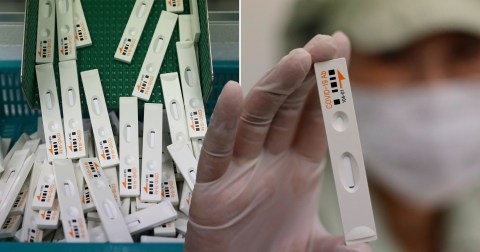There Is No Evidence Coronavirus Antibody Tests Can Show Immunity – WHO Says
World Health Organization (WHO) has cautioned countries against investing too much in antibody tests aimed at detecting whether a person has already had coronavirus.
Antibody tests – also known as serelogical tests – detect a person’s blood for antibodies. Antibodies are proteins produced by the immune system to defend itself against a foreign invasion such as a virus.
The UK is one of many nations intending to purchase the kits, which are seen as a way for countries to exit lockdown by showing who might have a degree of immunity to the disease.
Downing street has spent £16 million on such kits from China – but so far the technology has proven ineffective.
However, the WHO warned that even if the tests could successfully prove a person had already had coronaviurs, there is ‘no evidence’ this guarantees immunity.
Speaking at a press conference in Geneva, executive director of the WHO’s emergencies programme Dr. Mike Ryan said;
Nobody is sure whether someone with antibodies is fully protected against having the disease or being exposed again. Plus some of the tests have issues with sensitivity. They may give a false negative result.
An American infectious disease epidemiologist, Dr Maria van Kerkhove said initial evidence did not suggest large numbers of people were developing antibodies after having the virus, meaning the chances of ‘herd immunity’ are not high.
Herd immunity is when a large amount of the population has become immune to an infection, indirectly protecting those who are not.
The WHO’s announcement is likely to cause confusion among UK officials, who have been racing to find antibody tests amid criticism they did not act fast enough to contain coronavirus.
Meanwhile, on Friday, a leading health expert warned Britain could face as many as 10 ‘further waves’ of coronavirus and have the highest death toll in Europe before herd immunity is reached.
Professor Anthony Costello, of University College London’s Institute for Global Health, stated that the ‘harsh reality’ is that ‘we were too slow with a number of things.
Hopes are now being pinned on the rapid development of a vaccine, with the government announcing the establishment of a new coronavirus task force earlier today.
WHO had on April 14 announced that there are more than 70 vaccines for COVID-19 currently in development, with three leading candidates.
All three – One from the Beijing Institute of Biotechnology with Hong Kong’s CanSino Bio and two from companies in the US – are currently undergoing human trials.
According to WHO, another 67 vaccines, developed by scientists worldwide including teams from the UK, are also working towards trials in humans.

